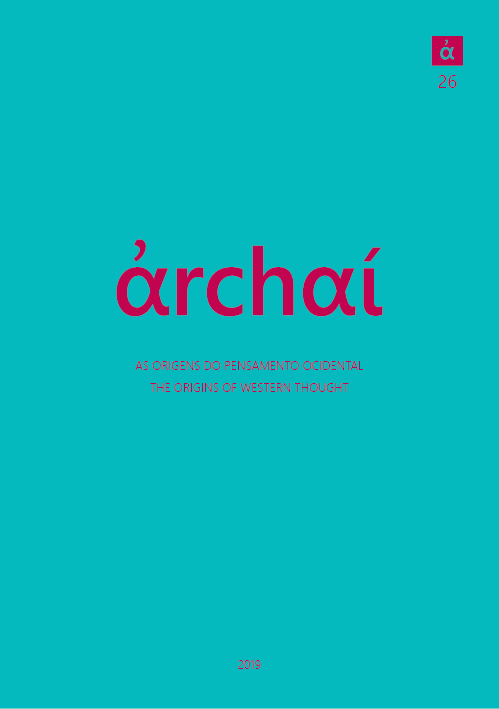Recollection and Metaphysics in Plato
DOI:
https://doi.org/10.14195/1984-249X_26_7Keywords:
Plato, recollection, condition of possibility, knowledgeAbstract
In recent scholarship, the doctrine of recollection has been studied to a much lesser extent than the other main themes of Plato's philosophy. Most of the modern scholars seem to consider the doctrine of recollection as a research method. They also seem to marginalize the reference to two worlds and the soul's movement between these worlds. This article intends to show that the doctrine of recollection not only is the necessary condition of possibility of our cognitive operations (not a research method), but also it is so only because of its metaphysical dimension.
Downloads
References
ACKRILL, J. (1973). Anamnesis in the Phaedo: Remarks on 73c-75c. In: LEE, E. N.; MOURELATOS, A. P. D.; RORTY, R. M. (eds.). Exegesis and argument. Studies in Greek Philosophy Presented to Gregory Vlastos. Assen, van Gorcum, p. 177-195.
BEDU-ADDO, J. (1991). Sense-experience and the argument for recollection in Plato’s Phaedo. Phronesis 36, p. 27-60.
BOSTOCK, D. (1986). Plato’s Phaedo. Oxford, Oxford University Press.
BURNET, J. (1911). Plato’s Phaedo. Oxford, Oxford University Press.
DECLEVA CAIZZI, F. (1986). Lettura del Fedone. Milano, Cusl.
DIMAS, P. (2003). Recollecting Forms in the Phaedo. Phronesis 48, p. 175-214.
FRANKLIN, L. (2005). Recollection and Philosophical reflection in Plato’s Phaedo. Phronesis 50, p. 289-314.
FREDE, D. (2001) Not in the Book: How Does Recollection Work? In: HAVLICEK, A; KARFÃK, F. (eds.). Plato’s Phaedo: Proceedings of the Second Symposium Platonicum Pragense, Prague, Oikoumenh, p. 241-265.
GALLOP, D. (1975). Plato. Phaedo. Oxford, Clarendon Press.
GERSON, L. P. (1999). The Recollection Argument revisited. Apeiron 34, p. 1-15.
GONZALEZ, F. J. (2007). How is the Truth of Beings in the soul? Interpreting “Anamneisis” in Plato. Elenchos 28, p. 275-302.
GOSLING, J. (1965). Similarity in the Phaedo 73f sqq. Phronesis 10, p. 151-161.
HACKFORTH, R. (1972) Plato’s Phaedo. 2ed. Cambridge, Cambridge University Press. (1ed. 1955).
KELSEY, S. (2000). Recollection in the Phaedo. Proceedings of the Boston Area Colloquium in Ancient Philosophy 16, p. 91-121.
LAFRANCE, Y. (2007). Les puissances cognitives de l'âme : la réminiscence et les Formes intelligibles dans le Ménon (80a-86d) et le Phédon (72e-77a). Études Platoniciennes 4, p. 239-252.
NAKAGAWA, S. (2000). Recollection and forms in Plato’s Phaedo. Hermathena 169, p. 57-68.
OSEY, R. (2001). The argument for recollection in the Phaedo: a defense of the standard interpretation. Scolia, new series, 10, p. 22-37.
POLITIS, V. (2010). Explanation ad Essence in Plato’s Phaedo. In: CHARLES, D. (ed.). Definition in Greek Philosophy. Oxford, Oxford University Press, p. 62-114.
SCOTT, D. (1995). Recollection and Experience. Cambridge, Cambridge University Press.
SEDLEY, D. (2007). Equal Sticks and Stones. In: SCOTT, D. (ed.). Maieusis: Essays in Ancient Philosophy in Honour of Myles Burnyeat. Oxford/New York, Oxford University Press, p. 68-85.
SMITH, N. (2000). Plato on Knowledge as a Power. Journal of the History of Philosophy 38, p. 145-168.
THEIN, K. (2001). Ἀνάμνησις and φÏόνησις in the Phaedo. In: HAVLICEK, A; KARFÃK, F. (eds.). Plato’s Phaedo: Proceedings of the Second Symposium Platonicum Pragense, Prague, Oikoumenh, p. 266-274.
TRABATTONI, F. (1998). Platone. Roma, Carocci.
TRABATTONI, F. (2003). Sui caratteri distintivi della “metafisica” di Platone (a partire dal Parmenide). Methexis 16, p. 43-63.
TRABATTONI, F. (2006). L’intuizione intellettuale in Platone. In margine ad alcune recenti pubblicazioni. Rivista di Storia della filosofia 61, p. 701-719.
TRABATTONI, F. (2010). Fondazionalismo o coerentismo? In margine alla terza definizione di á¼Ï€Î¹ÏƒÏ„ήμη nel Teeteto. Ιn: MAZZARA, G.; NAPOLI, V. (ed.). Platone: la teoria del sogno nel Teeteto. Atti del Convegno Internazionale, Palermo 2008. Sankt Augustin, Academia, p. 295-317.
WEISS, R. (2000). The Phaedo’s rejection of the Meno’s theory of recollection. Scripta Classica Israelica 19, p. 51-70.
WILLIAMS, T. (2002). Two aspects of Platonic recollection. Apeiron 35, p. 131-152.
WOOLF, R. (2000). Commentary on Kelsey. Proceedings of the Boston Area Colloquium in Ancient Philosophy 16, p. 121-131.
Downloads
Published
How to Cite
Issue
Section
License
Given the public access policy of the journal, the use of the published texts is free, with the obligation of recognizing the original authorship and the first publication in this journal. The authors of the published contributions are entirely and exclusively responsible for their contents.
1. The authors authorize the publication of the article in this journal.
2. The authors guarantee that the contribution is original, and take full responsibility for its content in case of impugnation by third parties.
3. The authors guarantee that the contribution is not under evaluation in another journal.
4. The authors keep the copyright and convey to the journal the right of first publication, the work being licensed under a Creative Commons Attribution License-BY.
5. The authors are allowed and stimulated to publicize and distribute their work on-line after the publication in the journal.
6. The authors of the approved works authorize the journal to distribute their content, after publication, for reproduction in content indexes, virtual libraries and similars.
7. The editors reserve the right to make adjustments to the text and to adequate the article to the editorial rules of the journal.



